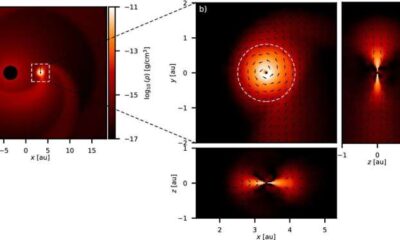Science
Innovator Captures Light at 2 Billion Frames Per Second

In a remarkable technological achievement, inventor Brian Haidet has successfully captured laser beams at an astonishing 2 billion frames per second (fps) for his YouTube channel, AlphaPhoenix. This groundbreaking experiment provides a unique visual perspective on the speed of light and its interaction with objects in close proximity.
Haidet’s latest project builds on his previous success from December 2022, when he developed a camera capable of recording at 1 million fps. To double that speed and enhance the resolution, he completely overhauled his recording apparatus. This extensive upgrade included improvements to the motors, hardware, oscilloscope, signaling protocols, recording software, and processing software.
The results of Haidet’s experiment are not only technically impressive, but they also illustrate a fascinating principle of physics. When light reflects off fog particles positioned closer to the camera, it appears to travel faster than light that is bouncing back from particles further away. This effect serves as a visual representation of special relativity, demonstrating how our perception of speed can be influenced by distance.
Haidet’s dedication to this project showcases the innovative spirit of independent creators in the field of science and technology. The footage, while captured as a one pixel by one pixel video, is repeated multiple times to produce a full rendering, allowing viewers to appreciate the nuances of light behavior.
For those intrigued by the intricacies of this experiment, Haidet has promised additional content that delves deeper into the science behind his findings. This exploration into the speed of light not only captivates the imagination but also provides an accessible entry point for viewers interested in the complexities of physics and technology.
Haidet’s work reinforces the notion that significant scientific advancements can emerge from unexpected sources, such as personal projects conducted in a home garage. As technology continues to evolve, such innovative experiments may pave the way for future discoveries in the realm of physics and beyond.
-

 Science1 month ago
Science1 month agoOhio State Study Uncovers Brain Connectivity and Function Links
-

 Politics1 month ago
Politics1 month agoHamas Chief Stresses Disarmament Tied to Occupation’s End
-

 Science1 month ago
Science1 month agoUniversity of Hawaiʻi Joins $25.6M AI Project for Disaster Monitoring
-

 Entertainment1 month ago
Entertainment1 month agoMegan Thee Stallion Exposes Alleged Online Attack by Bots
-

 Science4 weeks ago
Science4 weeks agoALMA Discovers Companion Orbiting Giant Star π 1 Gruis
-

 Science2 months ago
Science2 months agoResearchers Challenge 200-Year-Old Physics Principle with Atomic Engines
-

 Entertainment1 month ago
Entertainment1 month agoPaloma Elsesser Shines at LA Event with Iconic Slicked-Back Bun
-

 World1 month ago
World1 month agoFDA Unveils Plan to Cut Drug Prices and Boost Biosimilars
-

 Business1 month ago
Business1 month agoMotley Fool Wealth Management Reduces Medtronic Holdings by 14.7%
-

 Top Stories1 month ago
Top Stories1 month agoFederal Agents Detain Driver in Addison; Protests Erupt Immediately
-

 Entertainment1 month ago
Entertainment1 month agoBeloved Artist and Community Leader Gloria Rosencrants Passes Away
-

 Politics2 months ago
Politics2 months agoNHP Foundation Secures Land for 158 Affordable Apartments in Denver








